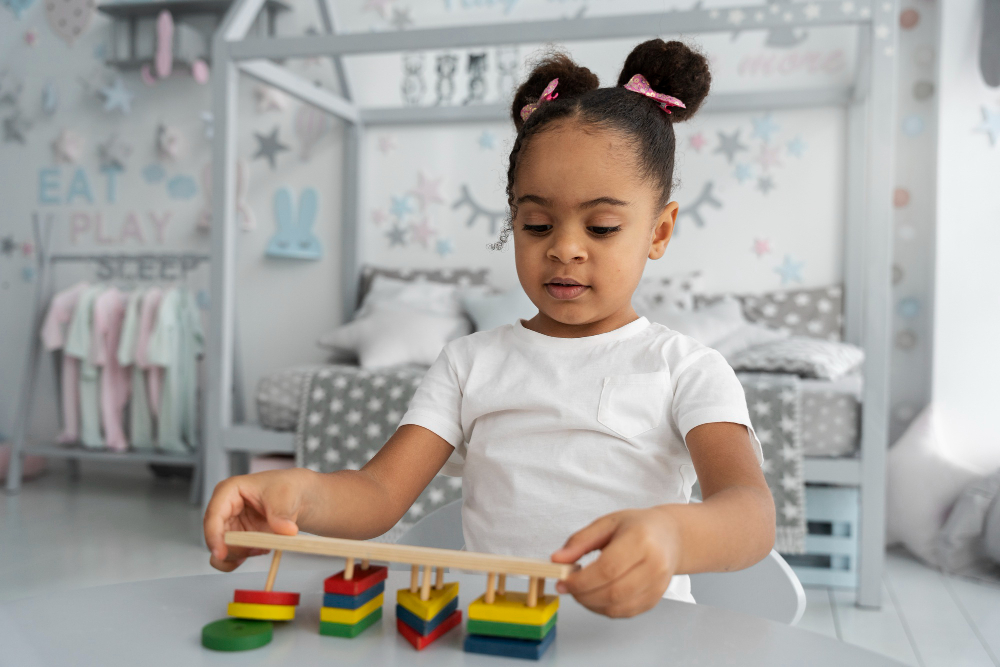Understanding Practical Life Activities
 Montessori education emphasizes the #development of practical life skills, which are everyday activities that help children gain independence and adapt to their environment. These activities are integral to the Montessori curriculum and #play a crucial role in developing both fine and #gross-motor skills.
Montessori education emphasizes the #development of practical life skills, which are everyday activities that help children gain independence and adapt to their environment. These activities are integral to the Montessori curriculum and #play a crucial role in developing both fine and #gross-motor skills.
Practical life activities are tasks that involve daily routines and self-care, such as dressing, cleaning, cooking, and personal hygiene. These activities are designed to be purposeful and meaningful, allowing children to engage in real-life tasks that foster independence and self-confidence.
The Importance of Motor Skills Development
Motor skills are divided into two categories:
- Fine Motor Skills: These involve the use of small muscles, particularly in the hands and fingers, enabling tasks like writing, buttoning, and cutting.
- Gross Motor Skills: These involve larger muscle groups used for movements such as walking, jumping, and climbing.
Developing these skills is essential for children's overall #growth, coordination, and ability to perform daily tasks independently.
How Practical Life Activities Enhance Motor Skills
Montessori practical life activities are meticulously designed to promote motor development:
- Pouring Exercises: Children practice pouring liquids from one container to another, enhancing hand-eye coordination and control.
- Spooning and Transferring: Using spoons or tongs to transfer objects helps refine fine motor skills and precision.
- Buttoning and Zipping: Dressing frames with buttons, zippers, and snaps allow children to practice dressing skills, improving dexterity.
- Sweeping and Mopping: Engaging in cleaning tasks strengthens #gross-motor-skills and teaches responsibility.
- Cutting with Scissors: Cutting paper along lines enhances hand strength and coordination.
Benefits of Practical Life Activities
Incorporating practical life activities into a child's routine offers numerous advantages:
- Independence: Children learn to perform tasks on their own, fostering self-reliance.
- Concentration: Focusing on detailed tasks enhances attention span.
- Coordination: Regular practice of these activities improves both fine and gross motor skills.
- Sense of Order: Following step-by-step processes instills organizational skills.
Implementing Practical Life Activities at Home
Parents can support their child's motor development by incorporating practical life activities into daily routines:
- Involve Children in Cooking: Allow them to wash vegetables, stir mixtures, or set the table.
- Encourage Dressing Themselves: Provide clothing with easy-to-use fasteners to promote independence.
- Assign Simple Chores: Tasks like dusting or watering plants can be both fun and educational.
- Create a Child-Friendly Environment: Arrange spaces where children can access tools and materials #safely.
Professional Development for Educators
Educators looking to deepen their understanding of practical life activities and motor skills development can benefit from specialized training. Montessori4Teachers.com offers courses that delve into these topics, providing valuable insights and strategies for effective implementation such as “The Prepared Environment: Montessori Class Design”.
Additional Resources
For further reading on the significance of practical life activities in Montessori education, the article "Understanding Montessori’s Approach to Child Development" offers an in-depth exploration. The #free resource “Classroom Jobs” provides ideas for jobs in your #classroom to increase children’s self-esteem and leadership skills.
Conclusion
Montessori practical life activities are fundamental in nurturing motor skills and fostering holistic development in children. By engaging in these purposeful tasks, children gain independence, confidence, and the physical coordination necessary for daily life.
For more insights and resources on Montessori education, follow us on Instagram.
- What is Montessori?
- Understanding Practical Life Activities
- Montessori and Special Needs: A Holistic Approach to Inclusive Learning
- Cognitive and Neurological Studies on Montessori Learning
- The Purpose of Practical Life in Montessori Education
- Montessori Theory in Practice: Bringing Child-Centered Learning to Life
- Understanding Uninterrupted Work Periods
- Unlocking the Power of Practical Life: A Montessori Foundation
- Exploring Montessori Materials: Essential Tools
- Understanding the Basis and Benefits of Montessori Education
- Montessori Magic: Bringing Practical Life Skills to Life Through Play
- Montessori Education: The Power of Practical Life Activities
- Can Everyday Tasks Make Your Child More Independent?